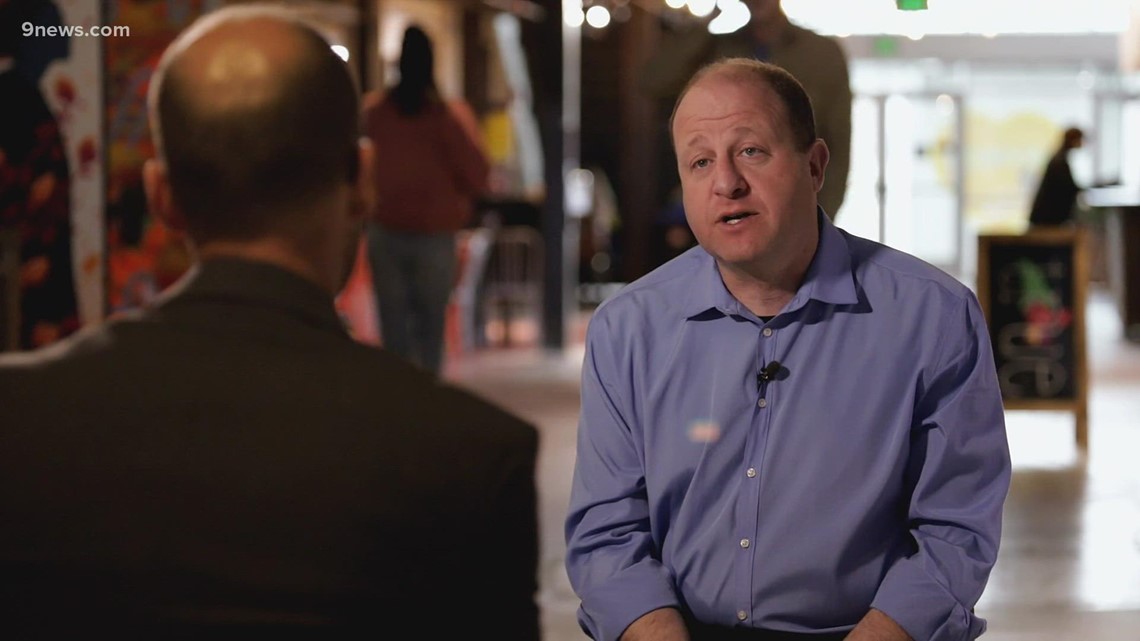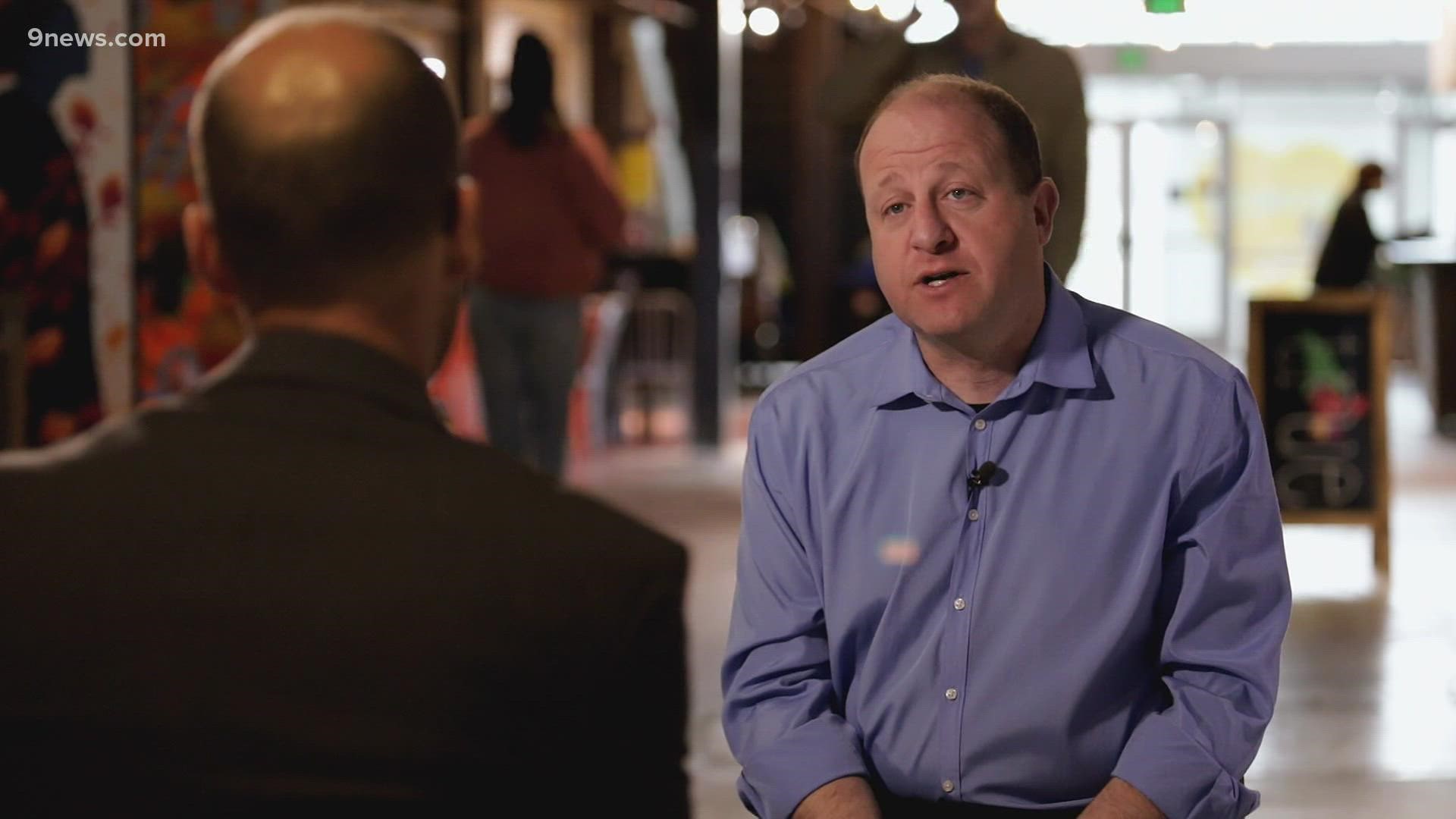DENVER — Colorado's current governor wants to be Colorado's next governor.
Gov. Jared Polis (D) officially kicked off his re-election campaign Tuesday.
In his video announcing his re-election campaign, Polis barely touches on the pandemic or rising crime -- topics we focused on to start our interview with him on the campaign trail.
9NEWS political reporter Marshall Zelinger: Were you held kicking and screaming to make crime a priority in this re-election campaign?
Polis: No, I mean public safety is something that, I think, we should lean into and embrace. And frankly, I think we have good thoughtful, practical solutions. I mean, one of the problems with the Republican side is they have part of the solution, and they're right, you need to catch criminals, prosecute them, lock them up. Yes. But it's that 'and,' right? Because even if you succeed in catching someone, you lock them up for two years, once they're out, you don't want them to recommit a crime. So, it's about -- Yes, it's about supporting law enforcement, it's about apprehending criminals, it's about convictions, but it's also about youth diversion and intervention programs, how to reduce recidivism within the prison walls, how you deal with mental and behavioral health including substance abuse to prevent crime before it occurs. So, it's really about trying to take those good ideas from the left and the right to make Colorado, as you know, and you can hold me accountable for this, one of the 10 safest states within the next five years.
Zelinger: I do Polis' Promises, so you know we will. I looked back at your first three State of the State addresses and you used the word 'crime' one time, and it was in relation to universal preschool. In your most recent State of the State, you said 'crime' six times. How is this not because you're running for re-election?
Polis: Well, first of all, I like to address it as 'public safety,' rather than crime. So, I mean, there's different ways to talk about it. So, I talk about it as how do we make Colorado a safer place to live, right? And that means safe from crime, safe from drunk drivers, that's also increased during the pandemic. So there's a variety of solutions. First of all, if public safety and ending crime was easy, somebody would have done it. No state, no city has ended crime. There's strategies that work and we're going to learn from them. Strategies in cities and states across the country. Some of which are already occurring here in Colorado, like one of the models that we want to scale and grow through our public safety package is called the co-responder model. Now, you know what? Summit County and Denver, they have this. What does it mean? It means it doesn't always need to be a law enforcement resource or a police officer if somebody's having a mental health issue. It might need to be a social worker or a counselor freeing up that law enforcement resource to fight real crime, while you're getting the person who's having a psychotic break the help they need, which might include institutionalization for a brief hold or it might include substance abuse treatment, right? So, it's a right response to the right -- for the right situation to keep people safe.
Zelinger: Republicans made crime, public safety one of their top three issues at a news conference in August. Are you plagiarizing and stealing from the Republicans?
Polis: It's an issue that's on people's minds, Marshall. It's good that both Republicans and Democrats are offering solutions to it. Now, I believe the Democrats' solution is better. Why? Because it's what the Republicans want to do plus a whole host of efforts to prevent crime from occurring in the first place.
Which is the very best outcome. I mean, apprehending and convicting a criminal, holding them accountable for the law, important. Even better, to prevent that crime from occurring before there's a victim.
>> Watch the full interview below: Colorado Gov. Jared Polis interview with 9NEWS
Zelinger: Your two-minute campaign video didn't really reference the pandemic; it never said the word 'COVID.' Shouldn't that be a topic that most Coloradans get to decide if you handled it well?
Polis: Look, if there's anything that the last two years have taught us, it's that leadership matters, and people might agree with some of the decisions I made, disagree with the decisions I made, but we always used data. We were decisive. And as a result, Colorado has the ninth-lowest fatality rate of any state in the country. Our economy was opened earlier than almost any other state. Our schools were open more than most other states. And our economic recovery is even stronger. So, any way you measure it, it works. Of course, in our video, we showed the vaccination effort, me in front of the buses, working with health care. I mean, there are a number of different images about that leadership that we showed. Again, whether you disagree or agree with everything I did, I think as a state, we've come through this better than most.
Zelinger: You resisted saying you've made a single mistake during the pandemic response, saying that you made the best decision with the information that you had. I think most Coloradans would say they might regret a decision or two over the last two years. You don't regret any?
Polis: I regret that we didn't have more information at any given time, Marshall. And that was very frustrating, especially in the early days of the pandemic. Novel virus. And in those early days, shortages of masks, of gloves, even our hospital workers didn't have enough. There were very few treatments or therapies in those early days. Now, there's much better therapies, there's highly effective vaccines. I really wish that we knew more early on. I wish we knew more even yesterday, as recently as yesterday, but yeah, I am confident, I can go to bed knowing, yes with the information we had, we made the best data-driven decisions that we could at every point in time.


Zelinger: New York now has a supervised drug injection site to prevent overdose deaths. Attorney General -- Democratic Attorney General Phil Weiser filed a brief in support of states allowing programs like that in other states. Should Colorado try that approach?
Polis: I haven't seen the brief. And I guess -- he sounds like he's defending the legal prerogative of states, perhaps. What we hope to do on behavioral health, mental health, substance abuse, is use some of the one-time funds that we have from the federal government to essentially increase the number of substance abuse treatment beds that the state has, especially for the homeless, for people who don't have the resources to get into a good addiction recovery program. Every Coloradan can succeed in overcoming addiction, but most people need help to get there. And so, that's why we're hoping to support over 500 new addiction recovery beds as part of our mental health package.
Zelinger: If you were presented a supervised drug injection site, do you support that?
Polis: I haven't looked at that and I don't think there's a bill to do that. I would say I am generally skeptical of normalizing drug abuse. I think what you need to do is get people into treatment and recovery so that they can recover their dignity and be able to support themselves and live fulfilling lives.
Zelinger: Last year, you signed a bill that would -- in part -- add a gas fee starting at 2 cents per gallon, progressing up eventually to 8 cents per gallon. Now you're supportive of an idea to delay that gas fee. You signed the bill that would cost more money. Why should you get credit for supporting an idea that may save me that same money?
Polis: First of all, Marshall, and you might recall, we wanted to have a cut in gas tax as part of that initial bill, a reduction in the gas fee. That got negotiated out, but what we did get was a reduction in vehicle registration fees to save people money. We want to continue the reduction in vehicle registration fees and make sure that there is no fee increase on gas for the next year. In addition, I strongly support Senator Mark Kelly (D) of Arizona, Senator Maggie Hassan (D) of New Hampshire, of a federal bill to suspend the 18-cent federal gas tax for a year. A tax holiday. So between those two bills, that can help reduce the cost at the pump of about 20 cents of what it otherwise would be in Colorado.
Zelinger: Is it trying to take credit for both sides? Like, I'm balancing your spending over here, but adding a fee, reducing something over here and oh by the way, that fee I added to you, I'm going to take it away and say I'm saving you money?
Polis: Well look, in the long run, people understand we need to pay for our roads. I don't think anybody's against there ever being a gas tax. But it's also very simple to understand that now is not the time. With $3.90 per gallon gas, now's the time to provide relief. Now's the time to have a holiday on that 18 cents federal tax, It's the time to avoid a 2-cent fee increase in Colorado. There's no question that that's what we should be doing when gas prices are high and people are frustrated with costs.
Zelinger: Why wouldn't you benefit, as a governor, with a split state legislature? Meaning Republicans in charge of the state Senate and Democrats in charge of the state House?
Polis: Well look, elections matter and we're going to work with members of both parties as we always have to get real results for Colorado. Ninety-five percent of the bills that I've signed were bipartisan, including a lot of our major achievements like kindergarten, preschool, reinsurance, that reduced the cost of insurance premiums for individuals by 24%. So, the people will have their say. Both candidates from both sides will present their visions for Colorado's future, and we'll look forward to working with Republicans and Democrats to move Colorado forward.
Zelinger: Would it be easier for you to get bills to your desk that have been through a split versus Democrats that may not have the same viewpoint as you?
Polis: Marshall, that's your job as a pundit to tell people whether that is or isn't. I have no idea. We operate in the world where we're going to work with everybody and we always have. We work with people of both parties to get things done, and whether it's easier or harder? You know, what do people prognosticate? I have no idea. But elections are important. People should vote. Vote for the candidate you think is best. And if I have the opportunity to serve as governor for another four years, we will be thrilled to work with members of the legislature of both sides.
Zelinger: Are you running for president in two years?
Polis: Absolutely not.
Zelinger: You know, no one's ever said yes to that question? Is that an 'absolutely not' like John Hickenlooper saying, 'I’m not going to run for Senate?' Absolutely not?
Polis: No, it's a lot stronger than that. It's absolutely not. I'm absolutely not doing that. I have no interest in doing that. I have two young kids. I'll either be governor for one more year or for five more years. And either way, I'll be really thrilled to spend some more quality time with our kids when it's done.
SUGGESTED VIDEOS: Full Episodes of Next with Kyle Clark

